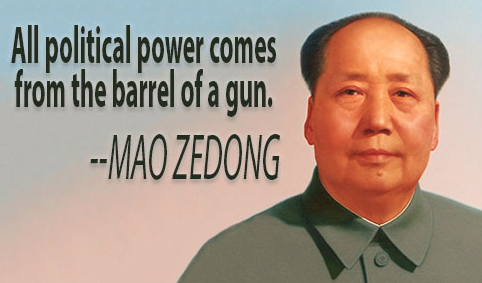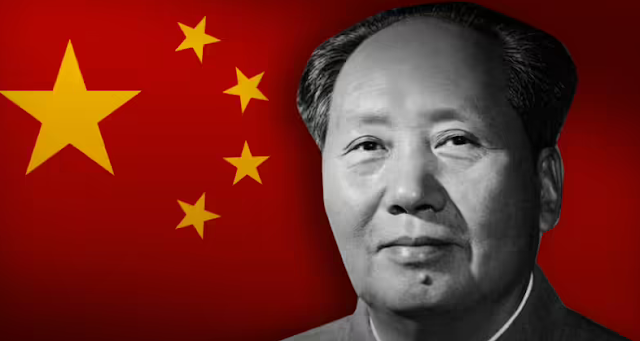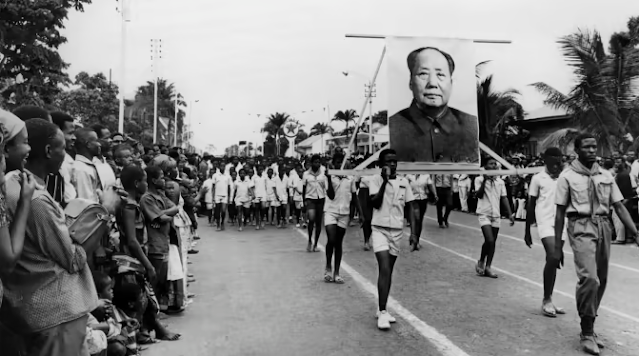Mao Zedong height
Mao Zedong is known as Chairman Mao. This is really curious question. People are more interested and searching for Mao Zedong height. Mao Zedong height is 1.8m.
Mao Zedong books
Little Red Book: Quotations from Chairman Mao Tse-tung
On Guerrilla Warfare
On Guerilla Warfare: Mao Tse-Tung On Guerilla Warfare
Selected Works of Mao Zedong
Mao Zedong to Chairman Mao
Chairman Mao - The Western perspective of Mao Zedong tends to present him as a tyrant whose every action ought to be condemned; however, the reality is rarely that simple. As we will find out, Mao is still adored in some parts of China. To understand the legacy of this highly controversial figure, revered in his homeland and criticized and despised abroad, one has to know his origins and aspirations.
Let us look at his motivations for adopting such a hardened approach toward radical reforms – some of which led to the death of millions of people. Mao was born into political or intellectual power, but he was not born into poverty. He was born on December 26, 1893 in Shaoshan village in Hunan province.His father was unlike the average Chinese peasant who toiled in poverty.
As a wealthy grain dealer and land-owning farmer, he expected his son to gain knowledge of the Confucian classics, accounting, and book keeping for purely utilitarian ends. Since his father was stern, authoritative, and prone to violent bursts of temper, Mao and his siblings found refuge and comfort in his gentle mother, a devout Buddhist. She hoped he might decide to become a monk and would promote peace as he followed in the Buddha's footsteps.
Mao would fulfill neither of his parents' ambitions for him. He was uninspired by Confucius' emphasis on moral perfection and filial piety. Instead of adhering to Confucius' commandment that children obey their parents and elders, Mao openly contradicted and opposed his father and teachers. Instead, he was passionately devoted to Chinese historical literature that described heroic uprisings, upheavals, and revolutions.
He ardently consumed narratives of adventurers, warriors, knights, and fighters in texts such as The Biography of the Ever-Faithful Yue Fei, Water Margin, The Three Kingdoms, Journey to the West, and The Romance of Sui and Tang. He kept his reading habit hidden from his father, who would become outraged at the sight of such a "useless" pursuit. He digested older texts like Records of the Grand Historian by ancient Chinese historian Sima Qian and Ban Gu's History of the Former Han Dynasty. He also read texts that explored China's contemporary struggles with foreign aggressors and invaders, such as Feng Guifen's Personal Protests from the Study of Jiao Bin.
Mao enrolled in a higher primary school Dongshan, located approximately 15 miles away from Shaoshan. There, Mao would be exposed to subjects like physics, chemistry, and biology. His education provided further exposure to the various rulers that attained glory in China's illustrious past: Yao and Shun, Qin Shi Huangdi, and Wu Di. He also gained exposure to foreign history and developed an admiration for Western historical icons' military and political acumens, like Napoleon, George Washington, Catherine the Great, and Abraham Lincoln.
The idea of China emerging from the backwaters and pursuing a path to similar eminence on a global scale was within his consciousness as he headed to Changsha: the capital city of the Hunan province, which was the primary base for the suppression of the Taiping Revolution.
The city and its events would galvanize Mao's evolution from a patriotic supporter of the Chinese monarchy to an anti-monarchical revolutionary. In the heat of his political ambitions, Mao decided to join the revolutionary Hunan army. Even though he did not experience significant military action during the six months he spent as a soldier, he obtained a first-hand experience of military life. After he was discharged from the military, he explored his options. Between working as a teacher and meeting a formative personality, Yang Changji, Mao had decided the time for contemplation had given way to the time for action.
In August 1918, Mao traveled to Beijing from the neighboring city of Wuhan with twenty-five of his comrades. Here, he would indulge in conflicting political ideologies before traveling home to partake in his mother's funeral. He did not visit his village upon his father's death almost four months later. Mao's return to Changsha coincided with the anti-imperialist May Fourth Movement in Beijing.
The protests that followed allowed Mao's personality to shine, and he became increasingly popular. By 1920, Mao had begun to renounce superstition and firmly embrace the tenets of communism. However, Mao had started to see Bolshevism's utility at this time. His experiences with political movements on a grassroots level had left him disillusioned with the idea of everyday Chinese citizens rising above centuries of the feudal rule to engender self-government.
However, the increasing political instability in the country led him to form the Workers' and Peasants' Red Army of China. His famed quote endures:We must know that
Political power is obtained from the barrel of the gun
Throughout the 1920s, Mao continued to organize peasantry, incite revolts, redistribute lands, and challenge the status-quo despite being hunted down by Chiang Kai-Shek, who had declared martial law. His complex relationship with the Soviets, the Chinese Communist Party – CCP, and KMT or Kuomintang – the leading Chinese Nationalist Party – endured throughout this era. Chiang posed a more significant threat to the communists than the encroaching Japanese. In the years between 1930 and 1934, he would rally no less than five different military encirclement campaigns to eradicate the pesky communists once and for all. In his fifth encirclement campaign, he delivered a devastating blow to the communist forces by personally mobilizing 700,000 of his men.
However, this prompted a wave of heroism that inspired young men and women to enlist in Mao's Red Army. When the Japanese withdrew from China after their defeat in World War II, the CCP confronted the KMT once again. In 1949, the KMT was decisively defeated, and Mao heralded the founding of the People's Republic of China on October 1, 1949. His early years at the helm of the country were a great success.
The CCP steered the country towards economic growth and greater political strength during this time. The Agrarian Reform Law of 1950 effectively destroyed the feudal and semi-feudal class by confiscating their land and redistributing it to the peasants. The land was also seized from foreigners, severely diminishing the power of numerous private industrialists. The early years of the People's Republic of China were nevertheless not free from conflict and strife. The Suppression of Counterrevolutionaries campaign inflicted violence on the former KMT leaders, the heads of secret societies, and religious authorities.
The Three-Antis campaign decimated the communists perceived as fraternizing too closely with the nation's capitalists. The capitalists themselves were subjected to The Five-Antis campaign, which compelled obedience to the CCP via charges of tax evasion, bribery, theft of state property, and dishonesty when entering into contractual obligations with the government contracts. University professors were not spared either. Mao had benefited from access to the Western liberal tradition, but the new generation would be exposed only to Soviet intellectual discourse.
In 1953, Mao launched his First Five-Year Plan to promote rapid industrialization. Over 80 percent of China's population lived in rural areas, but the CCP government invested over 80 percent of its budget into the urban economy. Tensions developed between the land-owning peasants who were forced to surrender the land they owned to the collectives without any financial benefits and the landless peasants who were more receptive to the collectivistic model.
As the nation's agriculture, commerce, and industry underwent a socialist transformation, its urban population grew from 77 million in 1953 to 99.5 million in 1957. This pattern of migration created a problem for the CCP. The nation's agricultural sector was not developing fast enough to generate the surplus capital needed to feed the increasing number of workers in the urban centers or reinvest it to modernize farming methods further. This would contribute to the disastrous food shortages of the Great Leap Forward in the future. When Mao introduced the Hundred Flowers campaign in 1956, the objective was to help convert the nation's intellectuals to communism. Instead, they began to critique the principles of communism, the CCP, and the Chinese government. They would pay dearly for openly voicing their dissent when Mao retaliated with a vicious anti-rightist campaign.
In 1958, Mao initiated his second Five Year Plan, in which he planned to experiment with communes. This plan, named the Great Leap Forward, would soon backfire. The major problem with the commune system was that political beliefs and a dogmatic insistence on ideological purity triumphed over common sense and working expertise. Everyone was zealously encouraged to exceed the targets that had been set for them through the use of sheer hard work and determination. By the following year, the catastrophic failure of the Great Leap Forward was evident. The poorly produced farm machinery fell apart. The low-quality steel used to construct new buildings ensured they did not stand for long. Overworked and suffering from insufficient sleep, thousands of workers were injured while working.
These technical and managerial oversights were compounded by the Soviet Union withdrawing financial support for China and three consecutive years of natural disasters. The diversion of a significant section of the workforce to small-scale industrial production and the inefficiency of the communal system regarding agricultural production meant there was an insufficient surplus of food to make up for the food shortage. The exact number of Chinese citizens who died because of the disastrous the Great Leap Forward varies, but historians estimate the figure to be between 15 and 55 million.
While the Western consensus rests on claiming that Mao was a mass murderer, this outlook might be skewed. Mao rarely ordered the killing of a civilian, even though he silenced his critics and exerted his authority quite loosely. The deaths of the Great Leap Forward were the result of a failed economic policy and continued natural disasters. That Mao ruled a large population did not help his cause either. There is no doubt that Mao is responsible for the death of millions of people, an act that cannot be forgiven; however, one has to realize the complex aspect of history. China's ascent toward becoming a global superpower started in Mao's era.
China's rise from poverty is unprecedented in modern history, but whether or not sacrificing the lives of millions of people along the way was worth it is a complicated question. Some people would say yes – like most Chinese, especially the youth. Even today, Maoism continues to resonate with the Chinese youth. However, the massive loss of life is not worth anything to others. Godfree Roberts, an eminent historian whose work focuses on China, clarifies this situation in the following words: "Hitler's [deeds] have been recorded by slogging through all the records and counting.
Most of Stalin and Mao were created or very good natured. So people looking at the database and logging in get different and lower numbers. For example, neither Stalin nor Mao Zedong caused famine. The difference is that we still have access to Hitler's evidence. We had trials, with evidence and testimony. Because we never defeated Stalin or Mao, we couldn't dig into the paperwork and why our countries were in a cold war with both of them, nothing bad we said about them would be criticized." These points do not serve to adopt an apologetic stance toward these dictators, but it does force one to grapple with the complex rigmarole of history.
Mao zedong cultural revolution
In fact, the Cultural Revolution that followed the Great Leap Forward was just as bad as it censored free speech and shoved propaganda down people's throats. The Cultural Revolution was a grand bid to secure power for Mao and his supporters within the CCP, but it also had widespread effects across the entire Chinese society. Mao had the support of radicalized youths that hung fervently to his rhetoric and were ready to inflict violence on anyone deemed a traitor to his ideals.
Nothing was sacred or spared, as the Red Guards had been urged to eradicate the "Four Olds" wherever they encountered them: old ideas, customs, habits, and culture. It is difficult to ascertain the exact number of lives lost during the Cultural Revolution but a 2011 estimate places the number of people who died during this period at between 500,000 to 8 million. Once again, these numbers are entirely speculative, and the death count could have been higher or lower.
So, what is Maoism?
Mao was informed by Marx's and Lenin's ideas and the model of communism the Soviets adopted. He nevertheless believed that the rural peasantry would form the revolutionary masses instead of the urban proletariat. After Mao's death, Maoism would inspire revolutionaries in other nations with sizable rural populations and a history of imperial exploitation.
The Nepalese rebels and the Naxalites in India are arguably the last descendants of Maoism. The Khmer Rouge is perhaps the most notorious proponent of Maoism. It is difficult to arrive at a definitive evaluation of Mao's legacy in China due to his long career and the sheer scale of his successes and failures. He has left a contentious legacy for the Chinese people, even if his reputation as a tyrant in the international community is far more coherent.







0 Comments
Chat with InfoWite!